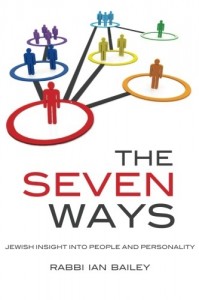The Seven Personality Types
The Seven Ways Cheat Sheet Below is a quick list of the seven major qualities & skill sets. Every person has a primary, secondary and a less-present tertiary quality that make up the bulk of our personalities. For example, a person’s personality may manifest as sustaining-guarding-creative or connective-creative-helping.
People are often conditioned, in their upbringing, to posses, to a limited extent, qualities which are not naturally in their personality (“conditioning”). A helping-type may be conditioned with creativity and use drama or art to help others with their emotions. People make decisions heavily influenced by their respective personality qualities, though they do have other components to their General Personality (i.e., entire personality, such as their birth order, culture, life experiences, etc.,). Each personality functions differently within what I call the System. The System is the sum total of all of the cultural norms and shared rules that form the basis of any given society or group.
Sustaining: This personality is split into two subcategories, half-brothers, you could say.
Sustaining-Sustaining: People who have a strong urge to subscribe to (“sustain”) the System and have no overbearing characteristics in their personality. They are free to mold themselves into whomever they want to be, but usually have a difficult time deciding what exact area to pursue. They are primarily concerned with obtaining basic sustenance for themselves and their families (“sustaining”).
Sustaining-Anything Else (Sustaining-Guarding, Sustaining-Creative, etc) “Later Sustainers”: People who subscribe to the System and want to do the done thing well (“sustain”). Their tendency is to be polite, good citizens who appreciate efficiency and organization, though they may not excel in those areas themselves. They have an inner desire to do what’s right, because it’s the right thing to do. They are sticklers for rules. Their Personality is heavily influenced by their secondary quality. I call someone in this type a “later sustainer” because they are later in the order of these seven sub-types.
Guarding: A detail-oriented quality, causing people to engage the System to the max. They adapt to their environment and intensely engage in the System’s normal methods for getting ahead. They are not always proficient in detail work, but they absorb and process information in a detail-based way. They are concerned with “guarding” themselves and the norms in their environment, and their view a threat to those things are something of deep concern. They have the ability to be very critical of others or very self-disciplined.
Creative: People who naturally have creative talent and a powerful faculty of imagination. They are inclined to write or paint or do any number of creative things. They are fun-loving, free spirited people, who decorate and liven up our world. Though there are many types of skills that can be called creative, ‘creative’ here means artistic creativity such as music, art, writing, and dance, as well as technical creativity such as useful inventions and computer software.
Investigative: People who seek out knowledge (“investigative”) and are good at remembering information-especially details and facts. They maintain a mental database filled with nuggets of wisdom and are usually imbued with a natural inclination to share their knowledge with others. Often they become doctors, psychiatrists, professors or accountants. They are empathetic people, with natural humility.
Helping: Emotional people who have a deep desire to care for and help others (“helping”). They are very empathetic and intuitive, and usually find themselves in helping professions.
the System. The System is the sum total of all of the cultural norms and shared rules that form the basis of any given society or group.
Sustaining: This personality is split into two subcategories, half-brothers, you could say.
Sustaining-Sustaining: People who have a strong urge to subscribe to (“sustain”) the System and have no overbearing characteristics in their personality. They are free to mold themselves into whomever they want to be, but usually have a difficult time deciding what exact area to pursue. They are primarily concerned with obtaining basic sustenance for themselves and their families (“sustaining”).
Sustaining-Anything Else (Sustaining-Guarding, Sustaining-Creative, etc) “Later Sustainers”: People who subscribe to the System and want to do the done thing well (“sustain”). Their tendency is to be polite, good citizens who appreciate efficiency and organization, though they may not excel in those areas themselves. They have an inner desire to do what’s right, because it’s the right thing to do. They are sticklers for rules. Their Personality is heavily influenced by their secondary quality. I call someone in this type a “later sustainer” because they are later in the order of these seven sub-types.
Guarding: A detail-oriented quality, causing people to engage the System to the max. They adapt to their environment and intensely engage in the System’s normal methods for getting ahead. They are not always proficient in detail work, but they absorb and process information in a detail-based way. They are concerned with “guarding” themselves and the norms in their environment, and their view a threat to those things are something of deep concern. They have the ability to be very critical of others or very self-disciplined.
Creative: People who naturally have creative talent and a powerful faculty of imagination. They are inclined to write or paint or do any number of creative things. They are fun-loving, free spirited people, who decorate and liven up our world. Though there are many types of skills that can be called creative, ‘creative’ here means artistic creativity such as music, art, writing, and dance, as well as technical creativity such as useful inventions and computer software.
Investigative: People who seek out knowledge (“investigative”) and are good at remembering information-especially details and facts. They maintain a mental database filled with nuggets of wisdom and are usually imbued with a natural inclination to share their knowledge with others. Often they become doctors, psychiatrists, professors or accountants. They are empathetic people, with natural humility.
Helping: Emotional people who have a deep desire to care for and help others (“helping”). They are very empathetic and intuitive, and usually find themselves in helping professions.
 Connective: Big picture, innovative people who want to change and improve the System. They are active and interactive, and good at bringing people together (“connective”). They can be very dynamic and charismatic, and have a keen understanding of human nature and how systems work.
Commanding: Strong, determined people who are able to take charge of a group and put people into place in the System (“commanding”). They can be dedicated to the people that work with them and accept advice, or be self-centered and dictatorial. They have a hard time seeing others’ opinion, but, in their healthy state, are the best leader for any organization.
Connective: Big picture, innovative people who want to change and improve the System. They are active and interactive, and good at bringing people together (“connective”). They can be very dynamic and charismatic, and have a keen understanding of human nature and how systems work.
Commanding: Strong, determined people who are able to take charge of a group and put people into place in the System (“commanding”). They can be dedicated to the people that work with them and accept advice, or be self-centered and dictatorial. They have a hard time seeing others’ opinion, but, in their healthy state, are the best leader for any organization.

